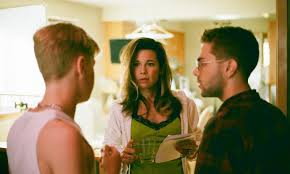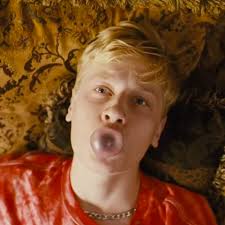 Well, I did it, Andrew from Fistful of Films. I watched Mommy. Andrew’s made no secret of his appreciation of this Cannes sensation- now I get the picture on his masthead- and after the film resurfaced during Thursday Movie Picks a couple of weeks ago, I vowed to finally give this a watch.
Well, I did it, Andrew from Fistful of Films. I watched Mommy. Andrew’s made no secret of his appreciation of this Cannes sensation- now I get the picture on his masthead- and after the film resurfaced during Thursday Movie Picks a couple of weeks ago, I vowed to finally give this a watch.
First, I’ll say that I liked Mommy better than The Score, the Robert De Niro-Edward Norton heist movie from 2001 that I watched the night before. Like Mommy, The Score is filmed and set in Montreal, where I spent the first twenty-four years of my life. I know the city well, well enough to know that Quebecers don’t sound like that. The accents and dialects (more French than Quebecois) aren’t a big deal and most non-Canadians may not even notice but they’re distracting for me. Mommy’s already off to a good start just by being a Canadian film with actual Canadians.
The actors in Mommy get more than just the Franglais right. As mother and son, Anne Dorval  and Antoine-Olivier Pilon always manage to make their increasingly complicated feelings and relationship believable, if not always likeable. Both Die (Dorval) and Steve (Pilon) are immediately off-putting. We are warned from the beginning that Steve can be a lot to take but I was unprepared for foul-mouthed and deliberately provocative style. Even Die, Steve’s long-suffering mother, is tough to take at first, presenting herself immediately as arrogant and confrontational through some pretty cocky gum-chewing.
and Antoine-Olivier Pilon always manage to make their increasingly complicated feelings and relationship believable, if not always likeable. Both Die (Dorval) and Steve (Pilon) are immediately off-putting. We are warned from the beginning that Steve can be a lot to take but I was unprepared for foul-mouthed and deliberately provocative style. Even Die, Steve’s long-suffering mother, is tough to take at first, presenting herself immediately as arrogant and confrontational through some pretty cocky gum-chewing.
I warmed to these characters quickly though. Die first. We quickly see how out of control- even dangerous- Steve is and I couldn’t help seeing her as a mother doing the best she can with an impossible situation. Steve has his charming- even sweet- side too. His feelings of guilt over ths burden he thinks he must be to his mother rise to a scene in a karaoke bar where he deliberately causes a scene in order to derail Die’s flirtation with a lawyer who she thinks can help with her son’s situation. The relationship between mother and son is unpredictable and at times a little strange but makes sense as we realize that they can’t help feeling that all they have is each other.
This relationship is written and acted to perfection even if Mommy isn’t. Dolan devotes way too much time to a stuttering former teacher who lives across the street without any real justification for doing so. I also could have done without the unusual 1.1 Aspect Ratio that is distracting at best and counter-productive during the more cinematic sequences that Dolan seems to love.
Have you seen Mommy? If you have, I would love to hear what you thought of the final scene.

I’m not sure it needed the framework of being set in a version of Canada where troublesome kids can just be surrendered to the government. I mean, it just felt so unnecessary to do that.
LikeLike
Yes! Thank you for that actually. I was wondering the same thing. If you want your audience to relate to your characters, why set up an alternate universe unless you absolutely have to?
LikeLike
OMG!!! Matt…I’m so happy you saw this!!!
A few things, just because you mention them as drawbacks. I loved the character of Kayla, especially the more I pondered her. Her backstory is never wholly revealed (although the moment in the empty room lends itself to coloring in a backstory of loss of a child), she makes so much of the character in just the way she so effortlessly attaches herself to Steve, and the way she quietly judges Die’s final decision…you can see it in her face and pick up in the tone and phrasing that she feels Die gave up, probably because the experience of loss on her own end forces her into a box of misunderstanding the matter. It’s really a beautiful performance, in my opinion.
And that ratio…I understand is a little distracting…but when that moment comes and the screen widens I was literally in awe!
And that final scene…the voice mail…the break free…for me this was such a beautiful way of Dolan to express that moment of clarity, mostly for Die, in knowing that she was doing what was best for her son…the only thing she knew how to do…and that Steve, despite his current situation, would survive.
It was an expression of hope.
LikeLike
I thought you’d be pleased and was looking forward to your response.
I think your points about Kayla make a lot of sense although as a whole I still can’t help feeling that the mother-son relationship was complex enough without Dolan needing to spend so much time on a third character. I should also mention that I too loved Kayla and thought Suzanne Clement did such an amazing job. I did think Mommy was maybe 15 minutes too long though and that Kayla’s subplot contributed to that.
The aspect ratio. I don’t know, man. Maybe if I hadn’t gone in blind on that. For the first twnety minutes I thought my DVD player must be broken or something so it was especially distracting for me.
Thanks for weighing in on the ending. I love the phone call scene and I believed every word of it. Wasn’t sure about the run for the exit though. So he’s in a straight jacket and doped up but they haven’t killed his spirit.
LikeLiked by 1 person
I completely think that the run for the exit was NOT literal but metaphorical. It didn’t really happen…he’s truly drugged and under restraint…but it was a figurative expression of hope that Die can rest easy knowing that this will not be the end of her son.
LikeLike
Never heard of this, but it sounds decent. Cheers!
LikeLike
oof, am stepping away from the vehicle, as a Mommy I would end up a gibbering wreck watching this. Thanks for the heads up 🙂
LikeLike
Thanks for introducing me to Mommy movie! I will include it on my movie bucket list to watch 🙂 Trust your review 🙂
LikeLike
Pingback: TIFF 2016: The Best | ASSHOLES WATCHING MOVIES